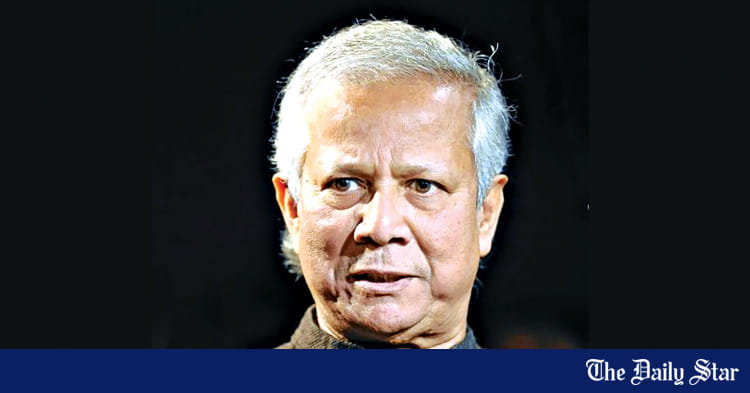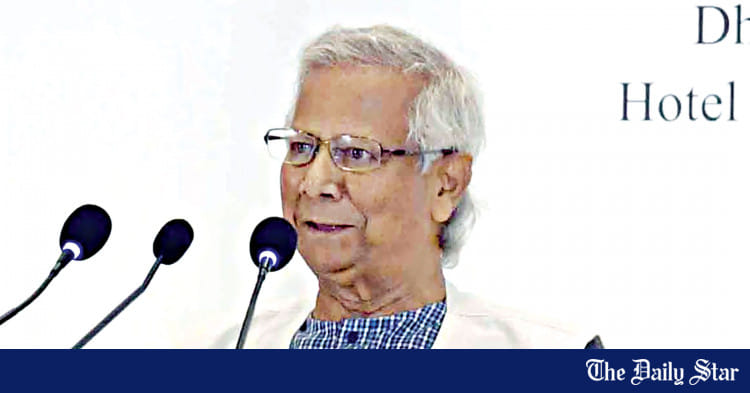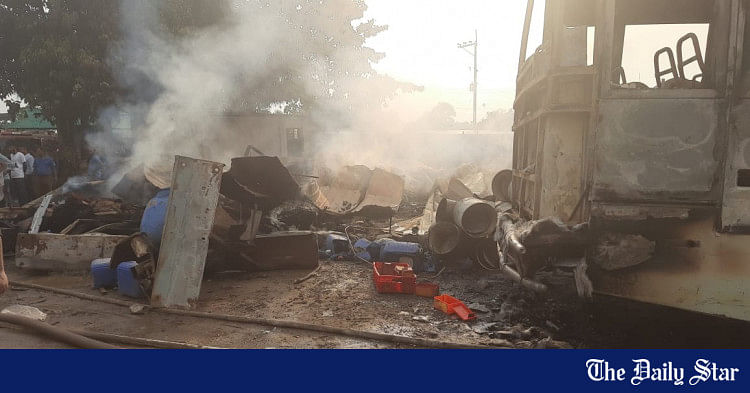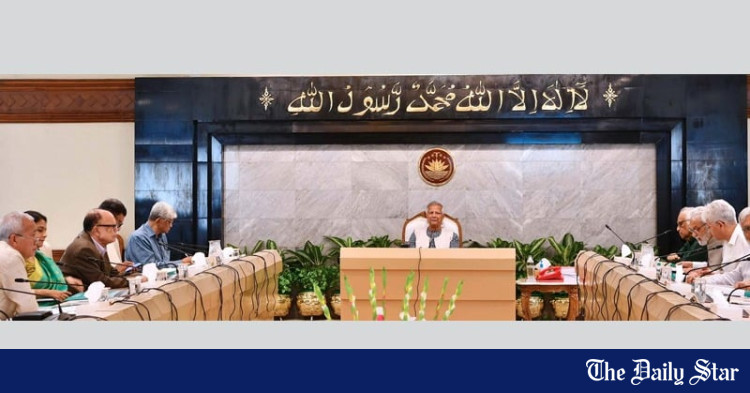Saif
Senior Member
- Messages
- 17,442
- Likes
- 8,381
- Nation

- Residence

- Axis Group


A paradigm shift is needed for a new Bangladesh
Paradigm shifts on a large scale involve the transformation of society.
A paradigm shift is needed for a new Bangladesh

Thousands of students took part in the Shaheedi March in remembrance of the martyrs of the July revolution, in Dhaka, on September 5, 2024. Photo: Amran Hossain
Bangladesh is often emotionally referred to as a "new Bangladesh" today. This new identity has been shaped by a lot of pride, sacrifice, and bloodshed. It is akin to the rebirth of a nation, one that emerged after a bloody revolution to overthrow an autocratic and brutal government.
The former regime blatantly disregarded human rights, manipulated institutions, and allowed rampant corruption and torture throughout society, including against political opposition. It turned key institutions—financial, educational, judicial and political—into tools of oppression. Society had been systemically dismantled, like the Ayyam al-Jahilliyyah (the pre-Islamic period of ignorance in Mecca).
When the students peacefully demonstrated for equity and non-discrimination in employment, the government brutally suppressed them—leading to a bloodshed. This triggered a nationwide uprising and the birth of a new Bangladesh.
What is the new Bangladesh?
When the very fabric of a society—social, economic, institutional structures such as religious, cultural, sports, civil, and military administration—is destroyed and banks are plundered, one can easily imagine what is needed to build a new country out of these ruins.
It is not simply about reforming or restructuring some areas in a non-systematic manner. It requires a holistic and systems-based approach to inspire and implement reforms across different sectors.
During this period of transition, we have to build a Bangladesh in which equal rights, diversity, justice, and access to all are ensured. This is not a short-term project. There should be a national plan which must include short-term, mid-term, and long-term visions. Such a transformation cannot be accomplished by the interim government alone, it requires the participation of all political parties.
It is unrealistic to expect that the interim government can complete this task very quickly. Their primary responsibility is to set the wheels of change in motion and then hand over power to an elected government that will work to realise the people's aspirations for this new Bangladesh.
I call this movement to realise the aspirations of the Bangladeshi people the "paradigm shift."
What is a paradigm shift?
A paradigm shift refers to a fundamental change in the way people think, perceive, and understand concepts, theories, or practices. It demands a transformation in norms and values, covering various fields such as science, philosophy, culture, sociology, politics, religion, or technology. Paradigm shifts lead people to act and think differently, develop new perspectives, and embrace innovation and discovery. Sometimes, they give birth to entirely new societies. In our case, I believe a new society is indeed being born, and everything that comes with it represents a paradigm shift.
Paradigm shifts on a large scale involve the transformation of society. These shifts require a combination of strategic planning, adaptability, and people's willingness to evolve.
Steps to implement a paradigm shift
The first step in implementing a paradigm shift is to conduct internal audits of key areas to assess the current state of operations, identify weaknesses or failures, document them, and initiate remedies to align changes with the overall mission.
Adopting such a shift involves actions such as initiating and encouraging corrective processes by changing the environment to promote creativity. This includes experimentation, innovation, and learning in areas like education, strategy, reward systems, evaluations, and incentives. It is also crucial to invest in education, re-skilling citizens, and equipping them with the necessary skills to thrive in the new environment.
More detailed efforts involve investing in research to cultivate intellectual capital and develop a thinking society. To achieve inclusion and diversity, fostering global collaboration is essential. This means engaging with other nations to share knowledge, best practices, and resources, and departing from traditional approaches.
To build resilience and adaptability, society must adopt coping mechanisms to deal with unexpected challenges and leverage technology and data to drive informed decision-making. Furthermore, a society experiencing moral decay must rejuvenate itself by revisiting ethical and moral values, aligning them with the people's expectations and leadership visions at all levels. This is critical to restoring trust and respect in society.
Government and strategic focus
Government and strategic planners should focus on revisiting economic models to align with the new paradigm. This may involve shifts from traditional capitalism to newer models such as social capitalism, green capitalism, or stakeholder capitalism. Dr Yunus, for example, promotes social and green capitalism, and some of his cabinet members advocate for social business. He has proposed a double or triple bottom line for evaluating success at the national, institutional, and individual levels, going beyond GDP to measure overall well-being.
In addition, our performance in regards to the following should also be reassessed:
a) Adoption of modern technologies
b) Globalisation and trade policies, including tariffs, agreements, gig-economics
c) Remote work, automation, and alternative labour markets
d) Environmental policies and their influence on business practices and consumer behaviour
e) Addressing evolving societal attitudes toward inequality, diversity, social justice, and corporate social responsibility
f) Reforms in tax laws, monetary policies, and regulatory frameworks
g) Investment in new industries and business models, fostering entrepreneurial ecosystems
h) Accommodating the voices and visions of Gen Z.
Mawdudur Rahman, PhD is professor emeritus, Suffolk University, Boston, US.
Thousands of students took part in the Shaheedi March in remembrance of the martyrs of the July revolution, in Dhaka, on September 5, 2024. Photo: Amran Hossain
Bangladesh is often emotionally referred to as a "new Bangladesh" today. This new identity has been shaped by a lot of pride, sacrifice, and bloodshed. It is akin to the rebirth of a nation, one that emerged after a bloody revolution to overthrow an autocratic and brutal government.
The former regime blatantly disregarded human rights, manipulated institutions, and allowed rampant corruption and torture throughout society, including against political opposition. It turned key institutions—financial, educational, judicial and political—into tools of oppression. Society had been systemically dismantled, like the Ayyam al-Jahilliyyah (the pre-Islamic period of ignorance in Mecca).
When the students peacefully demonstrated for equity and non-discrimination in employment, the government brutally suppressed them—leading to a bloodshed. This triggered a nationwide uprising and the birth of a new Bangladesh.
What is the new Bangladesh?
When the very fabric of a society—social, economic, institutional structures such as religious, cultural, sports, civil, and military administration—is destroyed and banks are plundered, one can easily imagine what is needed to build a new country out of these ruins.
It is not simply about reforming or restructuring some areas in a non-systematic manner. It requires a holistic and systems-based approach to inspire and implement reforms across different sectors.
During this period of transition, we have to build a Bangladesh in which equal rights, diversity, justice, and access to all are ensured. This is not a short-term project. There should be a national plan which must include short-term, mid-term, and long-term visions. Such a transformation cannot be accomplished by the interim government alone, it requires the participation of all political parties.
It is unrealistic to expect that the interim government can complete this task very quickly. Their primary responsibility is to set the wheels of change in motion and then hand over power to an elected government that will work to realise the people's aspirations for this new Bangladesh.
I call this movement to realise the aspirations of the Bangladeshi people the "paradigm shift."
What is a paradigm shift?
A paradigm shift refers to a fundamental change in the way people think, perceive, and understand concepts, theories, or practices. It demands a transformation in norms and values, covering various fields such as science, philosophy, culture, sociology, politics, religion, or technology. Paradigm shifts lead people to act and think differently, develop new perspectives, and embrace innovation and discovery. Sometimes, they give birth to entirely new societies. In our case, I believe a new society is indeed being born, and everything that comes with it represents a paradigm shift.
Paradigm shifts on a large scale involve the transformation of society. These shifts require a combination of strategic planning, adaptability, and people's willingness to evolve.
Steps to implement a paradigm shift
The first step in implementing a paradigm shift is to conduct internal audits of key areas to assess the current state of operations, identify weaknesses or failures, document them, and initiate remedies to align changes with the overall mission.
Adopting such a shift involves actions such as initiating and encouraging corrective processes by changing the environment to promote creativity. This includes experimentation, innovation, and learning in areas like education, strategy, reward systems, evaluations, and incentives. It is also crucial to invest in education, re-skilling citizens, and equipping them with the necessary skills to thrive in the new environment.
More detailed efforts involve investing in research to cultivate intellectual capital and develop a thinking society. To achieve inclusion and diversity, fostering global collaboration is essential. This means engaging with other nations to share knowledge, best practices, and resources, and departing from traditional approaches.
To build resilience and adaptability, society must adopt coping mechanisms to deal with unexpected challenges and leverage technology and data to drive informed decision-making. Furthermore, a society experiencing moral decay must rejuvenate itself by revisiting ethical and moral values, aligning them with the people's expectations and leadership visions at all levels. This is critical to restoring trust and respect in society.
Government and strategic focus
Government and strategic planners should focus on revisiting economic models to align with the new paradigm. This may involve shifts from traditional capitalism to newer models such as social capitalism, green capitalism, or stakeholder capitalism. Dr Yunus, for example, promotes social and green capitalism, and some of his cabinet members advocate for social business. He has proposed a double or triple bottom line for evaluating success at the national, institutional, and individual levels, going beyond GDP to measure overall well-being.
In addition, our performance in regards to the following should also be reassessed:
a) Adoption of modern technologies
b) Globalisation and trade policies, including tariffs, agreements, gig-economics
c) Remote work, automation, and alternative labour markets
d) Environmental policies and their influence on business practices and consumer behaviour
e) Addressing evolving societal attitudes toward inequality, diversity, social justice, and corporate social responsibility
f) Reforms in tax laws, monetary policies, and regulatory frameworks
g) Investment in new industries and business models, fostering entrepreneurial ecosystems
h) Accommodating the voices and visions of Gen Z.
Mawdudur Rahman, PhD is professor emeritus, Suffolk University, Boston, US.







